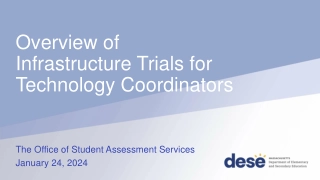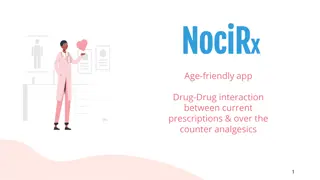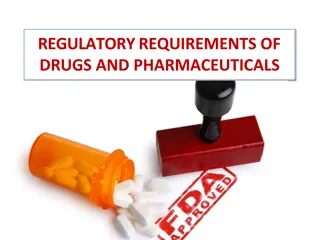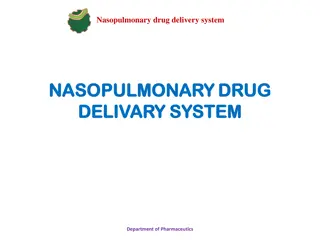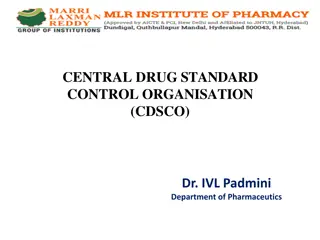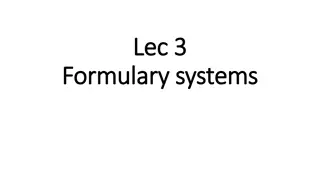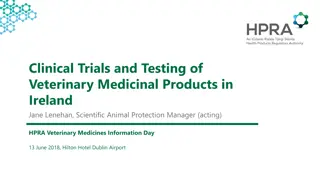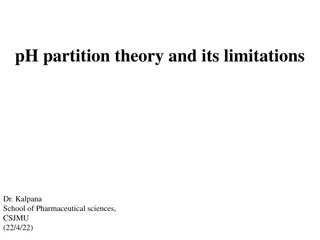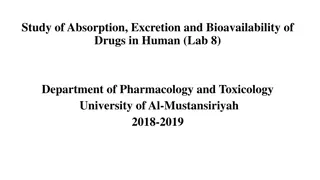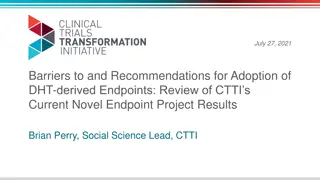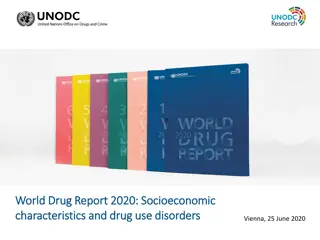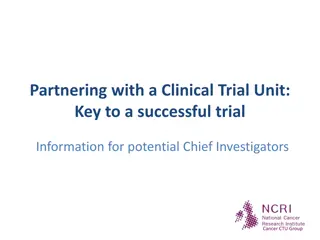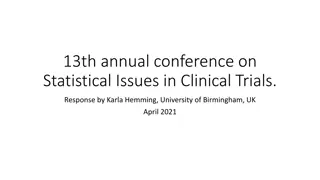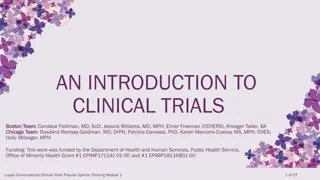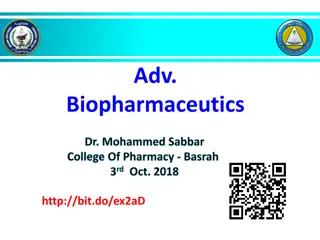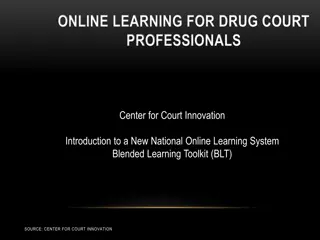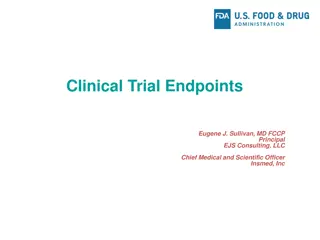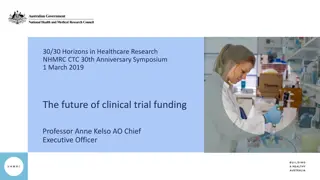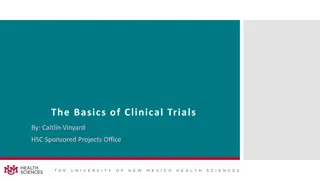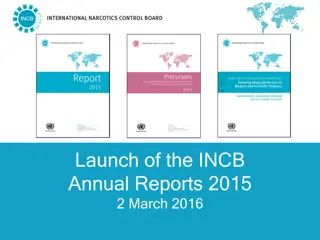Staff and Trials Overview at KVK Champhai, Mizoram
KVK Champhai, Mizoram, has a diverse staff including scientists and support staff. They conduct on-farm trials in disciplines like agronomy, horticulture, and plant protection. Trials aim to refine and assess technologies for crops like maize, beans, soybean, and more under various conditions. Speci
2 views • 49 slides
Infrastructure Trials for Technology Coordinators - Overview and Logistics
Explore the essential aspects of conducting infrastructure trials for technology coordinators in educational settings. The session covers topics such as determining the need for trials, tasks for technology staff, resources and support available, and live sandbox time for practical application. Pres
2 views • 58 slides
Age-Friendly App: Managing Drug-Drug Interactions Between Prescriptions and OTC Analgesics
The Age-Friendly app addresses the crucial issue of drug-drug interactions between current prescriptions and over-the-counter analgesics in the geriatric population. With a significant percentage of OTC sales attributed to older adults, there is an increased risk of adverse drug events due to polyph
1 views • 25 slides
Ethical Issues in Clinical Pharmacy Research by Dr. Haider Raheem Mohammad
Research ethics play a crucial role in clinical trials and therapeutic research in the field of pharmacy. From discovery to validation, all medicines undergo rigorous evaluation processes to ensure safety, efficacy, and freedom from adverse effects. Clinical trials in both animals and humans are ess
0 views • 20 slides
Understanding Regulatory Requirements of Drugs and Pharmaceuticals
Drug regulation involves controlling drug use through international agreement authorities like the FDA, EMA, and PMDA. The FDA plays a crucial role in drug evaluation and research, biologic evaluation, devices, and food safety. There are various types of applications for drug approval, along with a
0 views • 28 slides
Polymeric Controlled Drug Delivery Systems
Polymeric controlled drug delivery systems play a crucial role in regulating drug release through diffusion, solvent penetration, and chemical mechanisms. These systems include diffusion-controlled, solvent-controlled, and chemically-controlled devices, each operating based on specific principles. S
0 views • 33 slides
Renal Pharmacology: Drug Excretion and Renal Clearance Questions
This comprehensive set of questions and answers covers topics related to drug excretion and renal pharmacology. It includes information on glomerular filtration, drug excretion mechanisms, dosage adjustments in renal impairment, factors influencing drug excretion, and the effects of long-term NSAID
0 views • 55 slides
Understanding Nasopulmonary Drug Delivery System
Nasopulmonary drug delivery system, utilizing the nasal route for drug administration, offers advantages such as hepatic first-pass metabolism avoidance and rapid drug absorption. This system is beneficial for pharmacologically active compounds with poor stability in gastrointestinal fluids. While i
0 views • 35 slides
Understanding Physicochemical Properties of Drugs
The physicochemical properties of drugs play a crucial role in their pharmacological effects. These properties include physical and chemical characteristics that influence interactions with biomolecules. Solubility, partition coefficient, and dissociation constant are key factors affecting drug beha
1 views • 46 slides
Overview of Central Drug Standard Control Organisation (CDSCO) in India
The Central Drug Standard Control Organisation (CDSCO) is the main regulatory body in India for pharmaceuticals, medical devices, and clinical trials. It functions under the Directorate General of Health Services, Ministry of Health and Family Welfare, Government of India. The CDSCO is responsible f
0 views • 18 slides
Understanding Formulary Systems in Healthcare
A formulary is a dynamic list of medications curated by healthcare professionals to guide drug selection based on efficacy, safety, cost, and patient acceptability. It plays a vital role in promoting evidence-based and cost-effective drug therapy, improving communication between prescribers and phar
0 views • 17 slides
Ways to Stay Drug Free: Lessons for Teens and Families
Understanding the reasons behind drug usage among teens, this lesson provides valuable resources and strategies to stay drug-free. It emphasizes the importance of making healthy decisions and offers alternatives to drug use. Additionally, it highlights the significance of saying no to drugs, provide
0 views • 17 slides
Understanding the Hatch-Waxman Act: Promoting Affordable Generic Drugs
The Hatch-Waxman Act, also known as The Drug Price Competition and Patent Term Restoration Act, was enacted in 1984 to amend patent laws and the Federal Food, Drug, and Cosmetic Act. It aims to reduce costs associated with generic drug approval, allow early experimental use, compensate branded drug
0 views • 49 slides
Understanding Clinical Trials: Types and Designs
Clinical trials are essential research studies that evaluate new tests and treatments to improve human health outcomes. They involve various phases, designs, and purposes, such as treatment trials, prevention trials, and observational studies. Different types of clinical trial designs include experi
7 views • 18 slides
Veterinary Medicinal Products Clinical Trials in Ireland
This presentation covers the process and regulations surrounding clinical trials and testing of veterinary medicinal products in Ireland. Topics include the application process, HPRA evaluation, fees, scope of legislation, and the purpose of clinical trials. Feedback from a 2016 HPRA survey on clini
3 views • 17 slides
Understanding Biopharmaceutics: pH Partition Theory and Drug Absorption
Biopharmaceutics explores how drug properties and administration methods impact drug absorption. Factors affecting oral absorption include membrane physiology and drug partitioning based on pH levels. The pH partition theory, explained by Brodie et al., highlights the role of drug lipid solubility a
0 views • 9 slides
Importance of In-Vitro Dissolution Testing in Drug Assessment
In drug development, in-vitro dissolution testing plays a crucial role in evaluating drug release from tablets when in-vivo bioavailability studies are limited. By ensuring drug release is close to 100% and uniform batch to batch, these tests help assess drug availability and effectiveness. Regulato
11 views • 10 slides
Understanding Pharmacodynamics: Potency and Efficacy
Pharmacodynamics explores how drugs interact with receptors in the body, affecting the magnitude of drug effects based on concentration. Graded dose-response relationships, potency, and efficacy play key roles in determining drug efficiency. Potency reflects the amount of drug needed for a specific
0 views • 21 slides
Understanding Drug Absorption, Excretion, and Bioavailability in Humans
Delve into the complex processes of drug absorption, excretion, and bioavailability in the human body. Learn about the various factors affecting drug absorption from the gastrointestinal tract, including biological, physiochemical, and pharmaceutical factors. Explore the mechanisms of drug transport
0 views • 24 slides
Understanding Quantitative Aspects of Drug Action
Explore the quantitative aspects of drug action, including drug receptor binding, concentration binding curves, dose-response curves, and types of antagonism. Learn to relate drug concentration to receptor binding capacity and response produced. Discover how concentration binding curves and dose-res
0 views • 29 slides
Brain Oxygen Optimization in Severe Traumatic Brain Injury (BOOST3) Trials Overview
Overview of the BOOST3 trials focusing on brain oxygen optimization in severe traumatic brain injury patients. The trials involve multiple PIs, training sessions, and hands-on ancillary studies. Various design principles and organizational values are emphasized, with grant awards distributed to diff
0 views • 13 slides
Emerging Trends in Clinical Trial Designs for Oncology Drug Development
Master protocols, seamless trials, and adaptive designs are revolutionizing oncology drug development. These innovative approaches involve multiple substudies with different objectives, evaluating investigational drugs across disease subtypes. Basket trials and umbrella trials offer flexibility in s
0 views • 13 slides
Enhancing Patient Engagement in Clinical Trials
This presentation highlights the importance of patient engagement in clinical trials, showcasing the value it brings to the drug development process. It covers various aspects such as quantifying impact, identifying opportunities, and the role of patient groups. The Clinical Trials Transformation In
0 views • 37 slides
Insights into the Salem Witch Trials
Discover the dark history of the Salem Witch Trials, where people were accused of witchcraft based on superstitions and fear. Learn about the beliefs, trials, possible explanations, options for the accused, and the chaos that ensued in Salem. The trials lasted from January 1692 to May 1693, revealin
0 views • 11 slides
Challenges and Recommendations for DHT-derived Endpoints in Clinical Trials
This study by CTTI explores barriers and solutions for adopting digitally derived endpoints in clinical trials. Through in-depth interviews with industry sponsors, the research identifies gaps, barriers, and recommendations for using DHT-derived novel endpoints as key endpoints in pivotal clinical t
0 views • 16 slides
Insights into the Salem Witch Trials
Explore the historical beliefs around witchcraft, the occurrences of the Salem witch trials, possible explanations for the trials, the options accused witches had, how events quickly spiraled out of control in Salem, and the duration of the trials from January 1692 to May 1693.
0 views • 10 slides
Impact of Socioeconomic Conditions on Drug Use Disorders: Insights from World Drug Report 2020
The World Drug Report 2020 highlights the strong correlation between socioeconomic factors and drug use disorders. Studies reveal that communities facing poverty, violence, and social inequality are at a higher risk of drug overdoses and addiction. Factors like income inequality, lack of social capi
1 views • 17 slides
Embracing Trials: A Biblical Perspective on Enduring Hardships
Understanding the role of trials in a Christian's life through the teachings of Peter. Be prepared to face trials, rejoice in Christ's sufferings, and never be ashamed of your faith amidst hardships. Others face trials too, so be encouraged and remain faithful.
0 views • 12 slides
Key Aspects of Partnering with a Clinical Trial Unit for Successful Trials
Understanding the role and benefits of partnering with a Clinical Trial Unit (CTU) is essential for potential Chief Investigators. A CTU handles various aspects of trial coordination, from developing trial materials to overseeing regulatory permissions and data management. UK Clinical Trials Units (
0 views • 48 slides
Statistical Issues in Clinical Trials: Insights from 13th Annual Conference
The 13th annual conference on Statistical Issues in Clinical Trials covered topics such as penalties for extra variation and limited degrees of freedom, the Diet-Heart Hypothesis, controlled trials, unit of randomization, and causal inference. Speakers highlighted the importance of addressing cluste
0 views • 10 slides
Understanding Targeted Clinical Investigation in Pharmacovigilance
Targeted clinical investigation plays a crucial role in pharmacovigilance by further evaluating significant risks identified in pre-approval clinical trials. This involves conducting pharmacokinetic and pharmacodynamic studies, genetic testing, interaction studies, and large simplified trials to ass
0 views • 12 slides
Introduction to Clinical Trials and Important Terms
This content provides an overview of clinical trials, including the goals, phases, study funding, and important terms such as placebo. Clinical trials aim to study the impacts of health and disease, evaluate treatments, and ensure safety and effectiveness. The phases of clinical trials are explained
0 views • 27 slides
Advances in Ophthalmic Drug Delivery Systems
This content explores various advanced ophthalmic drug delivery systems including erodible ophthalmic inserts, soluble ocular drug inserts, new ophthalmic drug delivery systems, and bioadhesive ophthalmic drug inserts. These innovative systems aim to provide accurate dosing, prolonged drug release,
0 views • 8 slides
Therapeutic Trials in HIV/HCV Coinfection: ION-4, Ally-2, and Viroteam 2015
In the study of therapeutic trials in HIV/HCV coinfection between 2014-2015, notable trials included ION-4 with LDV/SOF treatment for 12 weeks in HCV/HIV co-infection patients, showing high SVR rates in both treatment-naive and experienced patients. Another trial, Ally-2, involved Daclatasvir and So
0 views • 15 slides
Innovative Online Learning for Drug Court Professionals
Center for Court Innovation has introduced a new National Drug Court Online Learning System aimed at assisting drug court professionals. This system offers free access to web-based training, expert video lessons, virtual site visits to drug treatment courts, practitioner interviews, and a resource l
0 views • 8 slides
Understanding Clinical Trial Endpoints and Regulatory Basis
Eugene J. Sullivan, MD, explains the importance of establishing efficacy in clinical trials based on substantial evidence from well-controlled trials. The discussion includes primary endpoints for Phase 3 trials, legal and regulatory requirements, and the significance of clinically meaningful effect
0 views • 21 slides
NHMRC's New Grant Program: Advancing Clinical Trials and Research Funding
The NHMRC's latest grant program aims to enhance research in healthcare by focusing on clinical trials funding across four key streams: Investigator Grants, Synergy Grants, Ideas Grants, and Strategic and Leveraging Grants. The redistribution of funding will see a significant increase in support for
0 views • 12 slides
Understanding Drug Testing Policies in the Workplace
The Drug-Free Workplace Act of 1988 mandates federal grant recipients to implement zero-tolerance drug policies to maintain a drug-free environment. Employers must establish clear policies, conduct awareness programs, offer counseling and rehabilitation services, and impose penalties for violations.
0 views • 19 slides
Understanding Clinical Trials: Phases, Types, and Definitions
Clinical trials play a crucial role in advancing medical research and treatment options. This comprehensive guide covers the basics of clinical trials, including their definition, phases, types, and key definitions like IND, IDE, NDA, and more. Discover how different phases of trials work, the vario
0 views • 16 slides
Overview of International Drug Control Efforts and Challenges in 2015-2016
The content highlights significant events related to international drug control efforts, emphasizing the launch of the INCB Annual Reports, the UNGASS session at the United Nations, and the focus on health, welfare, and challenges in combating drug abuse. It discusses issues such as new psychoactive
0 views • 13 slides

